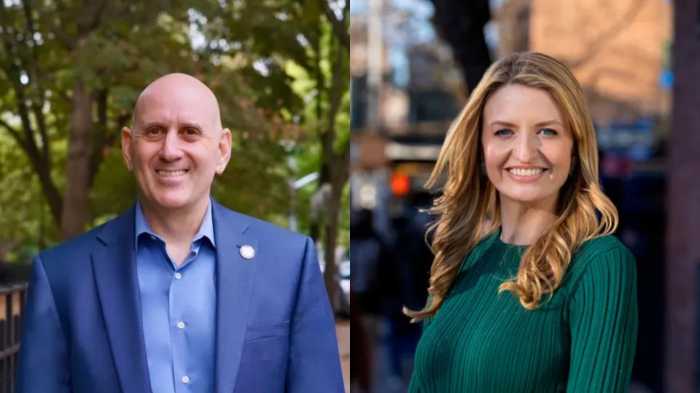The city is going to the dogs.
And cats. And guinea pigs, reptiles and birds.
While the popularity of “emotional support animals” is hard to measure, critters that provide therapeutic support to individuals with emotional and psychiatric disorders — such as post-traumatic stress syndrome, anxiety and depression — is undeniable.
“It’s not so much an upswing, as a groundswell of emotional support animals (known as ESAs),” said Karen Copeland, a Manhattan lawyer who specializes in animal law.
While service animals must be accommodated and allowed by landlords, airlines, restaurateurs, and others, not everyone is thrilled by the increasing courtesies and protections afforded ESAs.
The Rent Stabilization Association doesn’t keep stats, but Director of Government Affairs Frank Ricci said “there has clearly been an increase in tenants trying to circumvent the ‘no pet rule’ by claiming (a pet) is an emotional support animal.”
Some tenants, he said in an email “have been harboring a pet in secret and now have been caught.” Other animals indeed provide needed support for troubled people, Ricci acknowledged, but there is “no way to tell the real story,” in part because it is so easy for individuals to obtain documentation testifying that an animal provides emotional support.
Since 2007, the city’s Department of Health and Mental Hygiene issued 1,206 licenses for “service” dogs, or those intensively trained to perform specific tasks for people with various disabilities. This includes guiding a blind person through traffic, alerting a deaf person to a dangerous condition or reminding someone to take medication. But the department doesn’t track emotional support animals, which can be almost any animal.
Services abound on the Internet offering letters from mental health professionals testifying to a person’s need for an ESA in exchange for the applicant completing a questionnaire and paying a fee. (None contacted would respond to questions about their services.)
Some critics — including owners of service animals — believe the ease with which anyone can have a pet classified as an ESA demeans the importance of service dogs, which are highly and specifically trained to help people with physical disabilities.
Amy Kaplan, a service dog handler, points out that the increasing proliferation of pets in public places “can become a safety dog hazard to service dog handlers.” While service dogs are extensively trained, ESAs are pets, and should they attempt to interact with working service dogs they can “distract the service dog and put the handler at risk of injury or illness.”
But Copeland, a lawyer, believes animals that help people with “invisible conditions” can actually increase the acceptance of service dogs.
In the last 10 years, the NYC Commission on Human Rights has logged 56 complaints concerning people being denied reasonable accommodations for their guide dogs and 10 complaints for “hearing” dogs. The Commission wasn’t able to provide statistics for the number of complaints received concerning denied accommodations for “ESAs” due to an antiquated computer system, although it does log and responds to them, a spokeswoman said.
“Under Commissioner [Carmelyn] Malalis, CCHR is in the process of a full review of its complaint-tracking system as part of its agency revitalization,” the spokeswoman said.
There is a wide range of people who have had their pets defined as ESA’s.
Eternity Guillen, 32, who is on disability and lives in West Harlem, says her two cats, Frapp and Garfield, are critical to her mental health.
“I call them my kids,” Guillen said, who was diagnosed with dissociative identity disorder, depression and post-traumatic stress disorder. Guillen said her kitties have a sixth sense as to when she needs calming, and help her control unruly emotions and blood pressure.
“When I’m upset, Garfield comes to me, so I will pay attention to him and stop being upset,” said Guillen, who lives with her two ESA’s in a building run by Community Access, an organization that provides housing and services for people with psychiatric disorders.
One of its programs, “Pet Access,” matches people with disabilities with unwanted animals, and arranges ways for them to obtain low cost veterinary care.
“People in our buildings with pets have much lower hospitalization rates than people in our buildings without pets,” Advocacy Coordinator Carla Rabinowitz said. Pets give isolated and withdrawn residents a reason to rise in the morning and prompt owners to take them outside for exercise and to the vet for care, she said, where they act as natural ice breakers. Pets can even help people with conditions such as high blood pressure and diabetes reduce the amount of medications they take, she added.
Brighton Beach resident Gene Shapiro, 41, received a letter from a therapist that allows him to tote his Chihuahua, Benny, everywhere. Shapiro said Benny is an ecstatic bundle of licks and love
“He flies for free now,” said Shapiro, the president of Interactive Vision Solutions, an audio visual staging, lighting and equipment rental firm. “That’s the main reason I got this letter.”
United Airlines, for example, charges a $125 fee for a one-way domestic air fare and another $125 service charge for each stopover of more than four hours within the U.S. or more than 24 hours outside of the U.S., according to the airline’s website. Charges are waived, however, for ESA animals, who also don’t have to fly in a plane’s cargo hold.
Shapiro said he used to suffer from depression, but Benny’s naturally elated state keeps the blues at bay.
“I just love this dog,” he said. “I wake up in the morning and feel better.”
Not all New Yorkers, however, are ready to sing the praises of support animals. In fact, Ricci, at the Rent Stabilization Association, said one woman once begged him to enforce a “no pet” rule in a building because “she had an autistic son who was deathly afraid of dogs.” Judges, he said, typically side with pet owners.
Litigation is increasingly avoided, Copeland said.
“[As] landlords and co-op boards are becoming more aware, they have to make accommodations to people with invisible disabilities,” she said.
It isn’t always that easy, Dinah Luck, a staff attorney for MFY Legal Services, recalling a case where a suicidal woman’s landlord was attempting to evict her because her ESA pit bull had “allegedly nipped someone.” The judge in that case ruled she “could keep the dog as long as she kept a muzzle on it,” Luck said.
Advocates say people with ESA’s must address any issues neighbors have with their animals.
Adriana Moretti, the co-owner of Chelsea’s Incognito Bistro, has welcomed several diners who claim their dogs are emotional support animals, sometimes to even their surprise.
“If someone doesn’t like animals and is sitting in my restaurant, I’ll tell them to leave before the pet owner,” Moretti said, who has guinea pigs with her husband.
“When you look into their eyes, you realize life is very simple: we make it complicated,” she said about her “wonderful little babies.”
Moretti’s said her physician suggested she obtain a letter testifying to her depression and anxiety issues and how the guinea pigs helped her manage her symptoms after, noticing how their power.
“I guess [businesses] may need proof I’m emotionally unstable,” Moretti said with a laugh. She had yet to have her guinea pigs certified as emotional support animals.





































